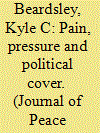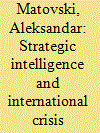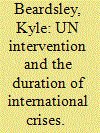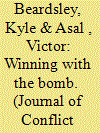| Srl | Item |
| 1 |
ID:
098410


|
|
|
|
|
| Publication |
2010.
|
| Summary/Abstract |
This article explores the effect of domestic and international politics on the choice of mediation as a conflict management strategy in international crises. Existing work has yet to fully explore how domestic and international audiences shape the combatants' preferences for mediation. With regard to domestic pressures, combatants often desire mediation as political cover for unpalatable concessions. That is, intermediaries might obscure responsibility for disappointing outcomes or signal the prudence of compromise. In terms of international audiences, affected third parties eager to shape the resolution outcome might lobby to serve as a mediator. Since both domestic and international audiences are affected by the crisis severity, the article also explores how the pain of fighting conditions the effect of international and domestic political pressures. Empirical analysis of international crises since World War I confirms that potential domestic audience costs for seeking peace and the propensity for concessions positively affect the probability of mediation. Less clear is the role of third-party incentives; the results indicate that a higher potential for neighboring-state intervention actually decreases the likelihood of mediation. Consistent with previous studies, conflict costs increase mediation incidence, and the findings also indicate that at high costs of conflict, states appear in less need of political cover for making concessions.
|
|
|
|
|
|
|
|
|
|
|
|
|
|
|
|
| 2 |
ID:
059895


|
|
|
| 3 |
ID:
177069


|
|
|
|
|
| Summary/Abstract |
High-quality strategic intelligence is commonly considered to be a stabilizing factor in international relations, steadying decision making and preventing misunderstandings and surprise attacks. This paper challenges this view by arguing that deep intelligence penetrations are some of the most destabilizing forces in high-stakes security crises. By exposing the opponents’ weaknesses and avenues of attack, intelligence penetration not only provides its beneficiaries with a potentially decisive offensive capability but also compels them to use it quickly, before the breach is discovered and the advantage is gone. Also, as the intelligence target is generally unaware of this capability, it does not serve as a deterrent that might force the target to the bargaining table. Thus, paradoxically, opposing sides are more likely to find a peaceful solution to crises when they do not have extensive strategic intelligence on each other.
|
|
|
|
|
|
|
|
|
|
|
|
|
|
|
|
| 4 |
ID:
112780


|
|
|
|
|
| Publication |
2012.
|
| Summary/Abstract |
This article examines the effect of UN actions on the duration of international crises. Four different types of action - assurance, diplomatic engagement, military involvement, and intimidation - and three different outcomes - compromise, victory, and stalemate - are considered. After building on the existing literature to develop expectations of how a third party like the UN shapes crisis trajectories, hypotheses are tested using the International Crisis Behavior (ICB) data and a new events dataset on UN activity. Results from competing-risks models reveal that UN military involvement does well to decrease the risk of one side achieving victory, and diplomatic engagement increases the ability of the belligerents to reach a compromise in the long run. Moreover, diplomatic engagement accompanied by military involvement substantially hastens the pace of stalemate outcomes. Both tactics, however, have some trade-offs. Military involvement can decrease the sense of urgency for compromise; diplomatic engagement can be used for insincere motives and increase the risk of one-sided victory over time. UN actions of assurance and simple intimidation have considerable shortcomings as crisis management vehicles.
|
|
|
|
|
|
|
|
|
|
|
|
|
|
|
|
| 5 |
ID:
087449


|
|
|
|
|
| Publication |
2009.
|
| Summary/Abstract |
Nuclear weapons' effects on an actor's success in coercive diplomacy are in part a function of how nuclear weapons change the perceived costs of conflict. The authors argue that states can improve their allotment of a good or convince an opponent to back down and have shorter crises if their opponents have greater expected costs of crisis. Noting that nuclear weapons increase the costs of full-escalation scenarios but decrease their probability, it is uncertain what impact nuclear weapons should have on expected costs of conflict. The authors assess crisis outcomes from 1945 to 2000 using the International Crisis Behavior data set. The evidence confirms that nuclear actors are more likely to prevail when facing a nonnuclear state. The expected duration of crisis in such asymmetric directed dyads is substantially smaller than the duration of crisis for actors in nonnuclear dyads. Nuclear actors in asymmetric dyads are also more likely to prevail than states in symmetric nuclear dyads.
|
|
|
|
|
|
|
|
|
|
|
|
|
|
|
|